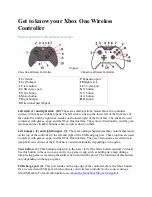
21
SafeGuard Controller User Manual
MAN-0115 Rev 0
!
SECTION 3
3.0
MAIN I/O INTERFACE PCB
The most basic SafeGuard Controller requires only the I/O PCB shown in Figure 3.1 for
interfacing to field wiring. The SafeGuard Controller’s primary power supply is applied
to terminals 9 & 11 of TB2. This may be from 10 – 30 VDC.
WARNING:
HIGH VOLTAGES SUCH AS 115 VAC APPLIED TO THESE
TERMINALS MAY CAUSE SEVERE DAMAGE!
DC output terminals 10 & 12 on TB2 provide up to 500mA of output power for
powering remote devices such as lamps, transmitters etc.
This PCB includes both
master (COMM 1)
and
slave
(COMM 2)
RS-485 Modbus ports,
5 amp form C relays for each common alarm event (A1, A2, FAULT/A3 & HORN), and
power supply I/O terminals. JP1 allows the RS-485 ports to be configured for 2 or 4 wire
operation. A 26 pin ribbon cable connects the I/O PCB to the SafeGuard Controller’s
CPU and Display nest assembly. Two I
2
C bus connectors allow addition of optional
functions such as analog I/O and discrete alarm relays for each channel.
Horizontal jumpers installed in JP1 connect the RS-485 port’s RX & TX lines,
simplifying 2 wire daisy chains by providing additional terminals for incoming and
outgoing cables. For example, installing the 2 COM 1 jumpers connects screw terminals
1 & 5 and terminals 3 & 7. Socketed RS-485 terminating resistors R6 (COMM 1) and
R12 (COMM 2) are located on the MAIN I/O board. These resistors should be removed
if communication wire lengths are very short (less than 25 feet), or, if the port is not at
the end of the communication line.
An Auxiliary Relays
piggyback
PCB may be added to the I/O PCB via ribbon cable J4.
These add another form C contact set to the common A1, A2 and HORN alarms.
Auxiliary Relay contacts are available at the TB1 (AUX) terminals shown in Figure 3.1.
















































